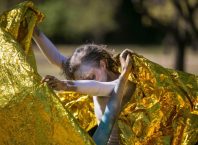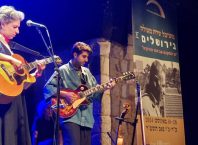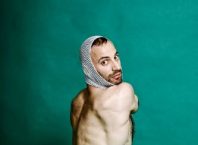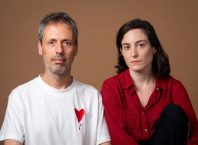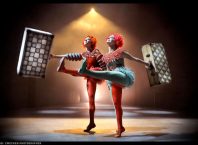In times of crisis, we seek solace and inspiration, the strength to endure and the hope for change. Poetry, with its ability to touch our hearts and minds, has the power to heal the spirit. The Metula Poets Festival is one of the highlights of the year, and this year the power of poetry is perhaps more significant than ever. In solidarity with the people of Metula and the Galilee, the festival will take place this year – although, for the first time in history, it cannot take place in its home in Metula. The Metula Poets Festival will be held in Jerusalem, from August 28 – 30, 2024 at Confederation House, Mishkenot Sha’ananim, and the Jerusalem Khan Theatre. Entrance to festival events (with the exception of shows at the Khan Theatre) is free of charge, on a space-available basis. The full festival program is available (in Hebrew) on the Confederation House website.
Effie Benaya, CEO of Confederation House and Director of the festival released a statement: “Metual, the magical and beloved town in Galilee, has become embattled ruins during the war. For some 30 years, the most important poetry festival in Israel was held there, under the management and production of Confederation House. It now faces the greatest disaster in its history. Out of deep solidarity with the people of Metula and with the entire Galilee, and believing in the power of poetry and its necessity especially in difficult times as these – we decided to hold the Metula Poetry Festival in Jerusalem. In honor of the festival we will organize buses for the people of Metula who have been evacuated from their homes, as well as for all the evacuated residents of the North and South, and welcome them to Jerusalem to enjoy the festival events. Let us embrace the brave residents of Metula and all the evacuated citizens of Israel.”
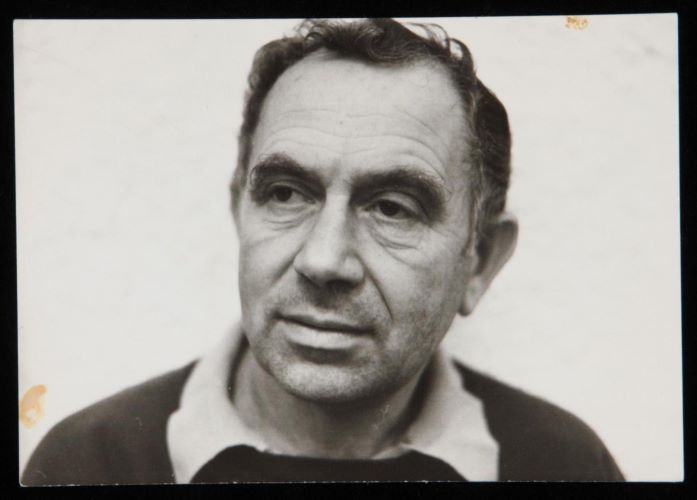
The title of this year’s festival “From the Place Where We Are Right,” is taken from a poem of Yehuda Amichai, and marking the 100th anniversary of his birth, the festive opening night will be a tribute to Amichai, with leading figures in Israeli poetry and literature – including Israel Prize winners Prof. Dan Miron, Nurit Zarchi, Erez Biton, and Haim Be’er – will discuss the poet and his work, and performances by leading musicians of several of Amichai’s poems that have been set to music.
On the Festival Program:*
The festival celebrates the great poets and writers of the past, with tributes to Yona Wallach, David Avidan, Hezy Leskly, Ka-Tsetnik, A.B. Yehoshua, and Yoel Hoffman, as well as contemporary artists such as Shimon Adaf, Erez Biton, Nurit Zarchi, Agi Mishol, Rabbi Elhanan Nir, and others.
At a special event, Ronny Someck will read from Erez Biton’s work, alongside other poets who will read from their works: Yoram Verta, Inbar Shafroni and Amos Noy. Biton will also read from his own works.
The current war and the trauma of October 7 open new channels of expression in Hebrew poetry. The Festival will host male and female poets whose common denominator is the poetic response to the feelings of pain, orphanhood and injustice caused by the war. Among other things, there will be a meeting with the poet Shachar Mario Mordechai, following a poem that he wrote about his father, who was seriously injured in the Yom Kippur War; with Gilad Meiri, who wrote a poem about his father, a war casualty who was abandoned by the state; and with the poet Aya Eliya, who published a book of poetry about her brother Itamar Eliya, who was killed in the Ansariya Ambush in South Lebanon in 1997.
The sounds of the war that broke out on October 7 also inspired male and female soldiers to write. Brigadier General Ofir Loyos, Chief Education Officer, and the poet Eliez Cohen created collections of poems by soldiers who write poetry under the name “Hineni,” (“here I am” in Hebrew) bringing the authentic voices of warriors from the battlefield. Cohen and Loyos will talk about the birth of this project. Soldiers whose poems were published in the collections will read from their works.
Ample space will also be given to the poetry of religious Zionism, for which the October 7 crisis marked an ideological watershed. A special meeting will be attended by Rabbi Elhanan Nir, who stirred up the religious camp with his poem “We Need a New Torah,” and by Bacol Serloui, who was one of the first to respond to the October events with religious poetry.
The Festival will close with a meeting with the kibbutz poets of the south: musician Hemi Rudner, who was born in Giv`at Brenner, the poet Israel Neta, a member of Kibbutz Be’eri, and Ruth Sabath, a member of Kibbutz Magen, will read their poems alongside Iftach Alony and Yotam Amitai from Kibbutz Gevulot. Eshkar Eldan Cohen will read poems by her father, Anadad Eldan, an Be’eri poet who survived the massacre and is 100 years old. Considerable attention will be devoted to a discussion of the kibbutz, and to the question of whether the kibbutz concept has collapsed, or whether there will be new hope after the atrocities and the massacre.
This year, a special emphasis will be placed on the poetry created and written in sectors that thus far have not received the attention they deserve: for the first time, three female writers of religious poetry will read their works at the Festival, and there will also be a meeting with the two black poets—Danny Adamso and the poet Wobit Worko Mengistu.
There will also be tribute events to important poets with a wide and mature body of work, including Hamutal Bar-Yosef and Karen Alkalay-Gut, and a special event with Israel-Prize-recipient-poet Nurit Zarchi, who will be hosted, together with her two creative daughters, artist Roni Taharlev and historian of science Dr. Erela Taharlev Ben-Shahar.
The most prominent book of poetry published this year is undoubtedly “Requiem” by the translator and poet Aharon Shabtai. The 85-year-old Tel Aviv poet will read from his book and speak about his writing at a major tribute event, where poets and creators inspired by Shabtai will read his poems and talk about his influence on them.
This year’s Festival marks the 90th birthday of Prof. Dan Miron, the pope of literature and its supreme judge, who has been the ruler of Hebrew poetry and literature for seven decades and is still going strong. In a festive gathering, the outstanding scholar will speak about his path in literature, his loves and hates, and poets and writers he nurtured and brought to public awareness will tell about him.
More at the Festival: a meeting with Kobi Meidan, who will read from his poems and translations; a meeting with Shimon Adaf and his editor, Prof. Yigal Schwartz; A conversation with Zeruya Shalev; a meeting with the social protest poets Sami Shalom Chetrit, Meital Nissim, Shlomi Hatuka and Doron Cohen; a meeting of literary families with Zeev Smilansky, Eyal Megged, Zeruya Shalev and others.
The festival events will be accompanied by the talented musicians Micha Biton, Israel Bright, Hadara Levin Areddy, Eli Magen, Ushi Masala, Itay Pearl, Mika Karni and Hemi Rudner.
The full Metula Poets Festival program is available in Hebrew on the Confederation House website.
*Information and texts on the Metula Poets Festival were provided in a press release.

